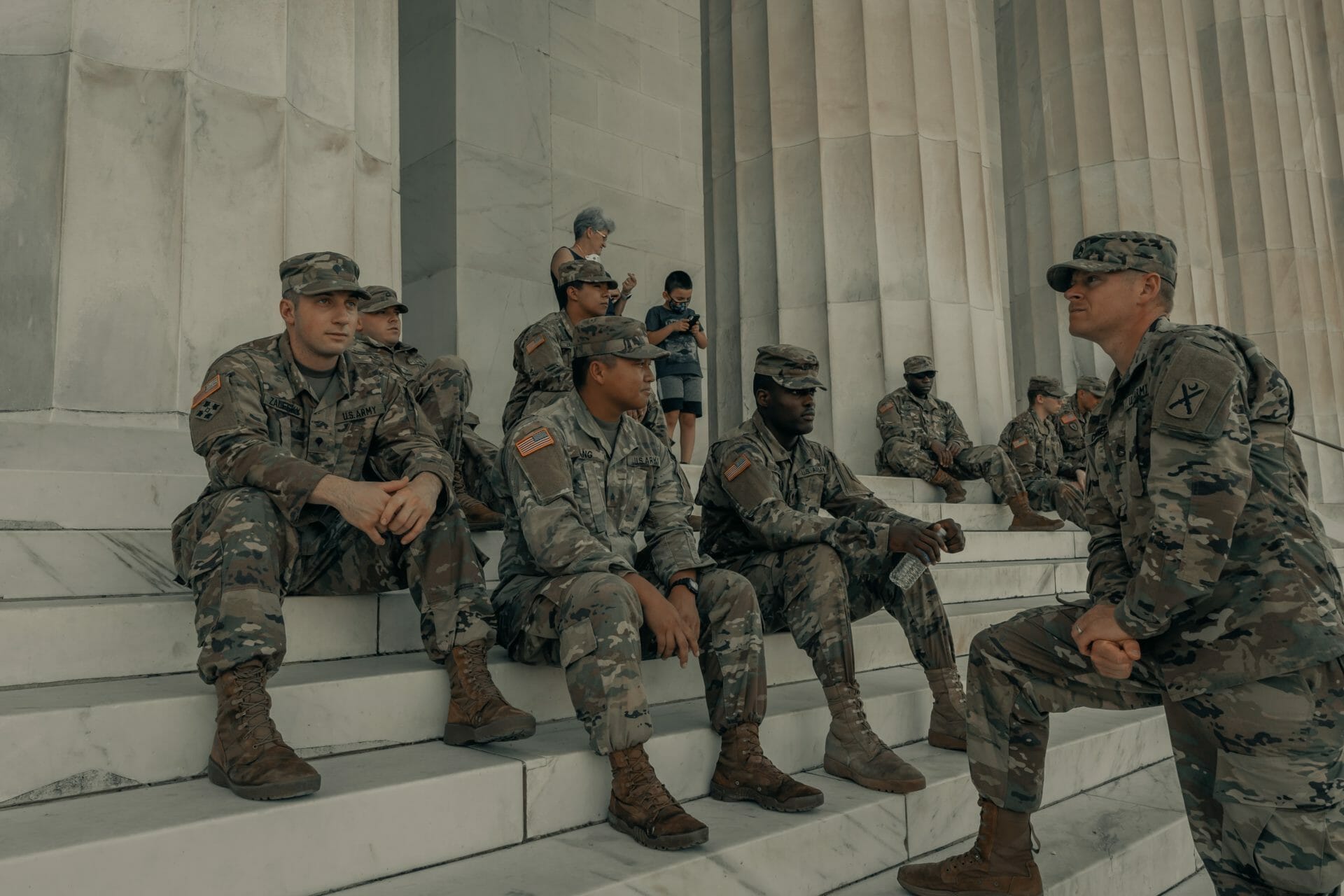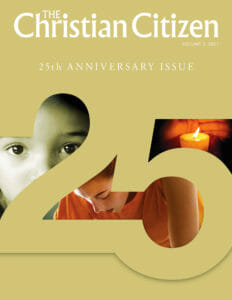
Photo by Clay Banks on Unsplash
What can we do for our troops?
Capt. Emilio Marrero
November 11, 2021
Editor’s note: This month, we are celebrating the 25th anniversary of The Christian Citizen by reprinting articles that previously appeared only in print or on an early version of our website. This article first published in Volume 3, 2009.
In my travels across the country as a Navy chaplain, I am frequently asked by pastors and church folks, “What can we do for our troops?” Often what they really mean is, “What can I send them in Iraq and Afghanistan so they know they’re appreciated?” While I appreciate their inquiry, I’d like to ask that we refine the question to, “What can we do for our troops in our communities?” While it may feel good to pack a few boxes of amenities and ship them around the world to our troops in a remote firebase in Afghanistan, I would contend that to do so is easy. It demands little commitment from us and can be a “fire-and-forget” approach. Besides, plenty of people are meeting that need. I’d like to see us focus instead on what we can do relationally with those who are in our midst.
I’d like to challenge our churches to consider that, since 2003, our nation has had more than 130,000 troops on average (with as many as 155,000 in 2008) in Iraq yearly. We have had an average of about 10,000 U.S. troops in Afghanistan every year until 2008, when we increased the number to 32,000. These numbers do not include the tens of thousands who are deployed to the Horn of Africa, Kuwait, Bahrain, the Persian Gulf, and remote volatile areas, such as the southern islands in the Philippines. Nor do they include the hundreds of thousands of U.S. contractors, state department, or other government, and even non-governmental, agencies actively engaged in these theaters of operation. Add these numbers up, and we jump into the millions.
Why is it important to understand these figures? The vast majority of those who have served in these remote areas and arduous conditions are your neighbors, church members, and community members. I once heard Gen. James L. Jones, the 32nd commandant of the Marine Corps and our current national security advisor, explain that in any given year 60 percent of the Marines whose contracts are due to terminate leave the corps. Overwhelmingly, these young men and women do not remain in the service past their first enlistment. For the most part, they do their duty and return home to their—and your—communities.
It is imperative that pastors, regardless of their positions on any of these wars, understand that a large population of veterans, contractors, and statesmen who have been directly impacted by the vulgar realities of war and deployment are mixed within their communities. These people hurt on many levels. One level often injured, but unseen or unaddressed, is the spiritual self. They ache deep within and long for healing, but often do not understand the reason. Long deployments in these theaters do not have to be fraught with intense combat, death, or violence to be traumatic to the soul. Simply being within such a context has its occupational hazards that wear away at the soul. Yet those experiences wound the spirit much more deeply when they are present.
The mental health community, in and out of the military, is frantically attempting to respond to unseen injuries at many levels. The most popular term used too frequently and inappropriately is post-traumatic stress disorder (PTSD). It has been reported by some newspapers that as many as 30 percent of all returning vets are suffering from PTSD. This is a misstatement that characterizes a significant number of returning veterans as broken or ill. The reality is that as many as 30 percent of our returning vets may be suffering from PTSD symptoms. However, over time, these symptoms subside, therefore lacking the chronic and persistent nature that defines PTSD as an illness. Nonetheless, the reality is that, while these may not be fully diagnosed instances of PTSD, something is leaving a persistent, unsettled feeling within our vets.
Provide a safe place to talk. Don’t be afraid to inquire and to ask them to share, but do so on their terms. Incorporate them in your ministry to give them a reference that will help them to concretely see what it means to be part of a loving community. The experience of combat often generates a real sense of belonging and intimacy rarely felt elsewhere, but a loving church with an incarnate message of hope can fit the bill. Nurture them back to the land of the recovering, for we are all recovering in the hands of the Great Healer.
Dr. Robert Grant, author of “The Way of the Wound,” points out that trauma often shatters our concept of reality. He asserts that, through traumatic experiences, our conceptual understanding of world order, our guarantee to safety, our sense of justice, or sense of God’s pre-eminence is turned upside down. Trauma tends to shatter our neat, systematic, intellectual concepts of reality and forces us to wrestle with a world and reality different from that which we work so hard to conceive. With the parameters of our reality in shambles, we step out to reorganize our thoughts and emotions, often in a daze and alone.
 Hundreds of thousands of men and women left secure and comfortable lifestyles in the United States and entered a reality in which some saw their friends die violent deaths, some came close to death themselves, and most witnessed firsthand religious oppression they’d never seen before as well as poverty and disenfranchisement affected by tyrants and religious zealots. The cultural shock on many levels was intense. Many were forced to put their needs—whether medical, financial, educational, familial, or vocational—on hold to go live in an alternate reality under arduous and austere conditions.
Hundreds of thousands of men and women left secure and comfortable lifestyles in the United States and entered a reality in which some saw their friends die violent deaths, some came close to death themselves, and most witnessed firsthand religious oppression they’d never seen before as well as poverty and disenfranchisement affected by tyrants and religious zealots. The cultural shock on many levels was intense. Many were forced to put their needs—whether medical, financial, educational, familial, or vocational—on hold to go live in an alternate reality under arduous and austere conditions.
These people are now home and—even if they never witnessed a shot fired at them—they witnessed the effects of war. They felt its vulgar presence. They sit in the same congregations, share the same roads, and shop in the same markets as you. They may be leading normal lives externally but internally, as described to me by a hospital corpsman master chief who saw combat in 2003, many are “trying frantically to quiet the demons deep inside” of them.
One Marine described it like this: “I feel like I shut down certain emotions while I was over there, and now I can’t turn them back on. I don’t feel anything when I look at my child.” I call you to look at these men and women through the lens of Jesus: “When he saw the crowds, he had compassion on them, because they were harassed and helpless, like sheep without a shepherd” (Matthew 9:36 NIV).
To return to our question, “What can we do for our troops?” I believe the first challenge is to convey care. You don’t have to be a vet to understand the need and demonstrate compassion. It is important to refrain from making assumptions about PTSD, combat, or the politics of war. Instead, provide a safe place to talk. Don’t be afraid to inquire and to ask them to share, but do so on their terms. Incorporate them in your ministry to give them a reference that will help them to concretely see what it means to be part of a loving community. The experience of combat often generates a real sense of belonging and intimacy rarely felt elsewhere, but a loving church with an incarnate message of hope can fit the bill. Nurture them back to the land of the recovering, for we are all recovering in the hands of the Great Healer.
Capt. Emilio Marrero, Chaplain Corps, USN (Retired). At time of writing, he was the force chaplain, Navy Expeditionary Combat Command, and author of “A Quiet Reality.”
The views expressed are those of the author and not necessarily those of American Baptist Home Mission Societies.


